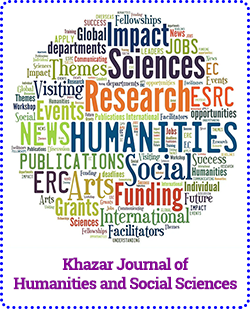International Experience in Formation of Foreign Language Communicative Competence in Tourism Students in the Context of Blended Learning
DOI:
https://doi.org/10.5782/.kjhss.2023.21.34Keywords:
communicative competence, tourism, word formation, vocabulary, semantic groups, blended learning, distance learningAbstract
The modern formation of foreign language communicative competence in tourism students in the context of blended learning is a key issue for the effective organization of the educational process. The issue of using blended learning as a tool for improving the practical and professional skills of tourism students is subject to wide discussion, as it has many advantages and disadvantages. The proposed results of the study are aimed at improving the organization of the educational process, as well as creating the most effective means for the formation of foreign language communicative competence of tourism students. The study aims to conduct an analytical assessment of the theoretical aspects of the formation of foreign language communicative competence, as well as to find ways to practically develop it in future specialists. With the help of scientific research methods, the foundations of the functioning of universities are formed, taking into account the prospects of digital technologies and the needs of the tourism services market. The results of the article can be useful for improving the distribution of the educational process of educational institutions between traditional and distance learning. The article examines the components of foreign language communicative competence and their cultural, ethical, and semantic aspects as the main principles of professional communication of tourism professionals. The results of the study indicate the need to integrate the educational process into distance learning. However, the traditional form should not be excluded, as it can be useful for the development of verbal communication skills. The study is important from the point of view of theoretical peculiarities of the formation of foreign language communicative competence in tourism students.
Downloads
References
- Abdallah M. M. S. (2017). Towards improving content and instruction of the ‘TESOL/TEFL for Special Needs’ course: an action research study Educational Action Research. P. 420–437. DOI: http://dx.doi.org/10.1080/09650792
- Arbaugh, J., Desai, А., Rau, В., & Sridhar, B. (2010). A review of research on online and blended learning in the management disciplines. Organization Management Journal, 7(1).
Bensen H., Cavusoglu C. (2017). Reflections on employing innovative approaches in an academic writing course P. 23–33. DOI: http://dx.doi.org/10.21506/j - Dmitrichenkova S. V., Chauzova V. A., Malykh E. A. (2017). Foreign Language Training of IT-students with the Programme "Translator in the Directions and Specialties of Engineering Faculty" Procedia Computer Science. P. 577–580. DOI: http://dx.doi.org/10.1016/
- Dolzhikova, A., Kurilenko, V., Biryukova, Yu., Glazova, O., & Arzumanova R. (2018). Translation-oriented reading of scientifi ctechnical texts vs ordinary reading: psychological and psycholinguistic aspects. XLinguae, 11 (2), 24–33. doi:10.18355/XL.2018.11.02.03
- Guzhelya, D., Biryukova, Yu., Shcherbakova, O., Akhnina, Kh., & Maslova, I. (2018). Linguodidactic modelling in teaching foreign languages to bilingual children. Revista Espacios, 40 (8), 1–17
- Narag, R.M. (2016). Sojourning of Foreign Students at Cagayan State University: A Case of Intercultural Communicative Competence (Unpublished Dissertation). Tuguegarao City: Cagayan State University
- Kargina, N.V., Ficenko, O.S. & Polyanskaya E.N. (2017) Technology of social manament in organization in the Russia federation: the theoretical aspect The Turkish online Journal of Design Art and Communication TOJDAC, December 2017 Special Edition, 1970- 1979
- Kukharenko, V. M. (2012). Pro systemu dystantsiinoho navchannia u vidkrytomu dystantsiinomu kursi [About the system of distance learning in an open distance course]. Informatsiini tekhnolohii v osviti – Information Technologies in Education, 11, 32–42
- Kajumov D.F., Vildanova, E.M., Mullagayanova, G.S., Gilyazeva E.N., Galeeva, L.I., & Strakhova, I.V. (2017). Th e imagery of spiritual concepts in teaching process expressed by Phraseological units of the English, Tatar, and Turkish languages. Man In India, 97 (3), 597–609.
- Salinas M. J. V., Burbat R. (2017). Foreign language learning with MOOC: Back to the future? Revista de Linguistica y Lenguas Aplicadas. P. 151–159. DOI: http://dx.doi.org/10.4995/rlyla.2017.6564
- Makharova Zarnigor. (2023). Formation of foreign language professional information and communication competence of students. Eurasian Journal of Learning and Academic Teaching, 16, 32–34.
- Tugusheva, E.Z., Bulanova, L.N., Vildanova, E.M., & Ilina, M.S. (2018). Forming Anticorruption Competence Through Teaching a Professionally oriented Language Course. Modern Journal of Language Teaching Methods, 8 (11), 429–436
- Nechaiuk, I. O. (2016). Intercultural communicative competence as a component of intercultural competence in diplomats training. Scientific Bulletin of International Humanitarian University. Series: Philology, 2(23), 114-118
- Telezhko, I., Biryukova, Yu., & Kurilenko, V. (2019). A model for forming tolerance in profession-oriented text translators as part of the process of developing their sociocultural competence. XLinguae, 12 (1), 116–124. doi:10.18355/XL.2019.12.01.09
- Plachynda, T., Herasymenko, L., Pukhalska, G., & Kryzhevska, K. (2019). Using Information Communication Technologies in Professional Training of Future Civil Aviation Pilots. Revista Romaneasca pentru Educatie Multidimentionala, 11(2), 270-281. doi:10.18662/rrem/129.
- Zavyalov, V.V. (2018) Models of teaching a foreign language to non-linguistic specialty students for professional purposes. Derzhavin Forum. No 6, 175-184
- Winther, E., & Klotz, V.K. (2014). Spezifi ka der berufl ichen Kompetenzdiagnostik — Inhalte und Methodologie. Zeitschrift für Erziehungswissenschaft, 7 (1), 9–32. doi:10.1007/s1161801304554








